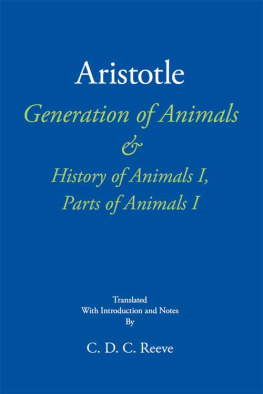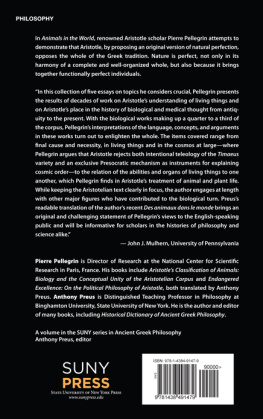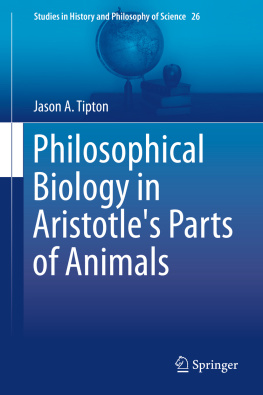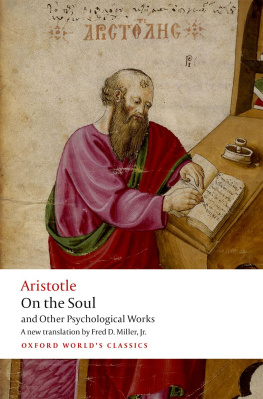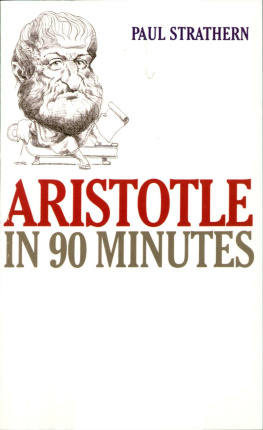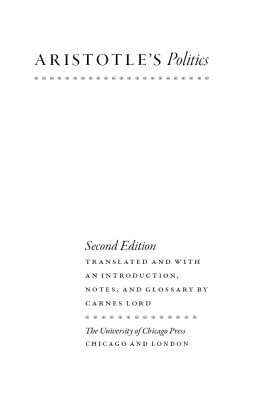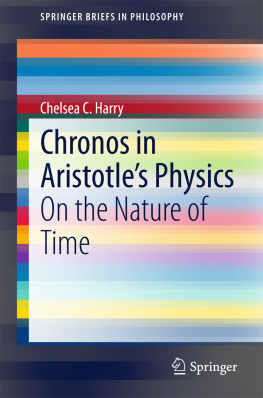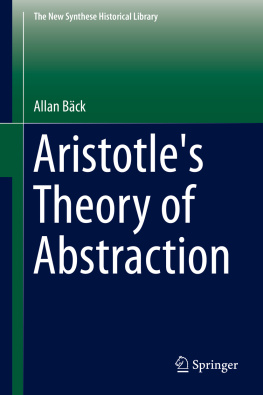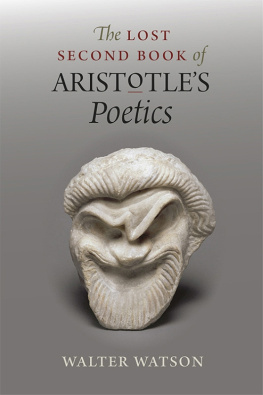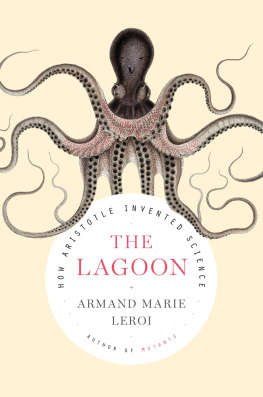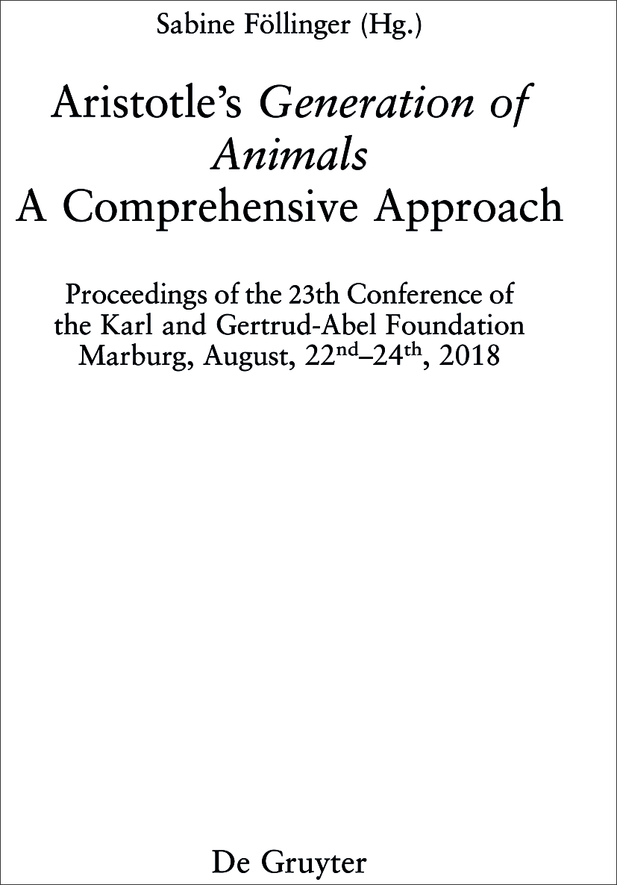The Deutsche Nationalbibliothek lists this publication in the Deutsche Nationalbibliografie; detailed bibliographic data are available on the Internet at http://dnb.dnb.de.
Prof. Dr. Sabine Fllinger
Philipps-Universitt Marburg FB 10, Institut fr Klassische Sprachen und Literaturen/Klassische Philologie Wilhelm-Rpke-Str. 6D 35032 Marburg Germany
Aristotles On Generation of Animals (GA) is of central importance for his biology, because in it he brings to fruition the large-scale project of developing a theory of generation that integrates empirical facts into contexts of justification and explains the phenomenon of sexuality. The type of justification that it employs forms a connection between the zoological studies and the Metaphysics, Physics and On Generation and Corruption, for in On Generation of Animals Aristotle explains reproduction in the framework of his general theory of coming to be and passing away, accounts for processes of reproduction and heredity
The complexity and high scientific level of GA is the result of Aristotles ambitious goal of explaining all phenomena of procreation and heredity in the zoological field by means of a comprehensive theory and not only to account for the existence of bisexuality, but also to look at other phenomena of reproduction. In his argumentation and presentation of the theory, the debate with other views especially those of the Presocratics, but also those of the Hippocratic authors plays an important role. Aristotles concern is to find explanations for empirical phenomena so that he may measure the value of other explanatory approaches, but also that of his own, according to the extent to which they do justice to the phenomena. In the context of his impressive scientific access to facts that were difficult to grasp with the empirical means of the time (the egg cell was first discovered in the 19th century; the explanation of inheritance processes was only possible thanks to modern genetics), Aristotle arrives at (from a modern point of view) astonishingly far-reaching findings, such as perceiving the epigenesis of embryonic development. At the same time, it becomes clear that he reaches the limits of his explanatory possibilities with the theoretical premises that he applies. This is the case, for example, when he justifies the similarity of offspring with the matrilineal line. All in all, GA proves itself to be an important work of scientific research not only for Aristotle, but also for the 4th century BCE in general. At the same time, GA is not only important for the history of science and as an example of scientific literature, but also from the perspective of the history of its reception, not least because Thomas Aquinas played an important role by taking up the Aristotelian concept of the difference of sexes and interpreting it in an idiosyncratic, but influential manner.
The degree of complexity of Generation of Animals is in keeping with the justified assumption which is made plausible by other evidence as well that it was one of Aristotles last writings, or perhaps even his last work.
This late Aristotelian work is simultaneously fascinating and challenging in its comprehensive and multi-layered character. That is why it was a pleasure for me to organize the international conference, which took place in Marburg from August 22nd to 24th, 2018.
The conferences aim was to gather scholars from different countries to intensely discuss GA and to bring together different approaches to and aspects of this work. At the same time, the conference was intended to tie in with previous conferences on On Generation of Animals and Aristotles biology in general, because interest in this area of Aristotles science has been growing over the last few years.
One might say that intensive research on Aristotles biology started with the seminal investigations conducted by Alan Gotthelf, James Lennox and Wolfgang Kullmann, who we can call the pioneers of research on Aristotles biology and its relation to his scientific methodology. In this context, one should also mention David Balme, Pierre Pellegrin and Geoffrey Lloyd, who likewise encouraged students to engage with Aristotelian biology. And so their research became the starting point for many studies. Since the 1990s interest in and fascination with GA has increased in various countries and along with it the study of Aristotelian biology. Especially in recent years, interest has continued to grow. This is demonstrated by the fact that, among other publications, entire studies have been dedicated to it, like Sophia Connells book
In addition, several conferences and workshops on Aristotelian biology have taken place over the years. I myself fondly look back on the conference I organized in 1995 with Wolfgang Kullmann, Some of the participants in the 2018 conference had also been at those conferences. There were other workshops in Pittsburgh, Toronto and Berlin in the last few years, as well as the conference organized by David Lefebvre in Paris in 2014 and the conference organized by Anne Peterson in Salt Lake City in 2016. All these activities show the vivid interest in research on Aristotelian biology and especially in On Generation of Animals.
The 2018 conference speakers were from six countries: the United States, Canada, England, Italy, France and Germany. Andrea Falcon and Mariska Leunissen were not able to participate in the conference and wrote contributions to the volume.
The somewhat showy title A Comprehensive Approach was chosen in order to take into account the fact that the perspectives from which this biological text was viewed at the conference were intended to be, and actually were, manifold. In accordance with the perspectives with which the individual researchers examined GA, various aspects of the work were discussed during the conference and in the present conference proceedings, all of which taken together contribute to the picture that we can form of this work. This picture includes the positioning of the text in the scientific context of its time (Christoph Hammann), as well as questions of coherence (Klaus Corcilius), method (Mariska Leunissen, Kurt Sier, Katharina Epstein) and the linguistic representation of argumentative structures (Sabine Fllinger; Thomas Busch). Additionally, the relationship between On the Generation of Animals and the Historia animalium is discussed (James Lennox). Other contributions deal with general topics such as embryonic development (Diana Quarantotto), the role of the heart (Christof Rapp), Aristotles conception of matter (Anne Siebels Peterson) and the role of pneuma (Jochen Althoff). Special problems that Aristotle poses in his theory of reproduction are also examined, such as the phenomenon of multiple births (David Lefebvre), the emergence of hybrids (Sophia Connell) and spontaneous generation (James Wilberding). Two studies are devoted to the works reception (Oliver Hellmann; Andrea Falcon).
To demonstrate the attempt to offer a comprehensive approach and to structure the contributions according to the main scope of the different topics, I have organized the volume into four sections (though I am aware that the sections occasionally overlap):


